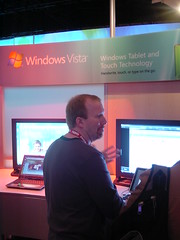First, I must confess that I am watching shadows. I’m studying them and thinking about them — and wondering about their workings and their importance. I have an awareness of the outside, but the opening from my version of the CAVE to the real world (rl) is still obscured. Yet, still, I’m here.
The CAVE I speak of is only metaphorically the one, about which Plato storied centuries ago. Virtually, it is the Center for Advanced Virtual Education, the brainchild of Walden University researcher, Kevin Jarrett, and the Second Life residence of myself, Will Richardson, Andy Carvin, and Annette Lamb, to mention only a few.
So I thought I would talk for just a bit about what I’ve been working on — here — in the CAVE.
 First of all, building is fun. It’s my Legos days back again, haunting me with the illusion of building great things. I built a typewriter first, and, according to some, not very efficiently. But efficiency will come. Then I became aware of and intrigued by scripting, writing programs that apply functionality to the objects you build. So now, if you click my typewriter, it loads 2¢ Worth, my blog, into your web browser. A glimpse of that CAVE opening, but only pretending.
First of all, building is fun. It’s my Legos days back again, haunting me with the illusion of building great things. I built a typewriter first, and, according to some, not very efficiently. But efficiency will come. Then I became aware of and intrigued by scripting, writing programs that apply functionality to the objects you build. So now, if you click my typewriter, it loads 2¢ Worth, my blog, into your web browser. A glimpse of that CAVE opening, but only pretending.
I’ve also built a radio, much more efficiently, that when clicked, it will load and immediately play my latest Connect Learning Podcast. The pattern is clear — access to my RL services, from Second Life.
 To further this theme, I’ve built a file cabinet, with drawers for eight of my most often performed presentations. When you click one of the drawers from inside of my office, your browser launches and the online wiki handouts for that presentation are loaded.
To further this theme, I’ve built a file cabinet, with drawers for eight of my most often performed presentations. When you click one of the drawers from inside of my office, your browser launches and the online wiki handouts for that presentation are loaded.
Now! The ridiculousness of this does not escape me. I’m in my presentation, pointing my audience to the online wiki handouts, via a presentation slide. It points to a web URL that will link SL users to teleport to my office. There you can click the drawer for the current presentation, which links you back out to your browser.
 If I had access to my avatar right now, he would be shaking his head in confusion and irritation.
If I had access to my avatar right now, he would be shaking his head in confusion and irritation.
It would appear that I am featuring technology for technologies sake, and there would be some truth to this. I am in the process of being seduced, yet again, by something new, exciting, and fun. But it is also something that has very little literal connection to what we are doing as teachers and learners — yet. And that’s the big YET. If Gartner Inc. is even close to right, that 80% of Internet users will be partly living, so to speak, a virtual character, then this is something to be paid attention to. It’s something for me, at least for the time being, to push and pull, and to try to find some traction that we might use as teachers and learners.


 My recent click explorations have had me bouncing around the ed tech in the UK world lately. I ran across this one as a related article to the one of VLEs for all learners.
My recent click explorations have had me bouncing around the ed tech in the UK world lately. I ran across this one as a related article to the one of VLEs for all learners.
 This is a story that I picked up on BBC News today. On the outset, it looks like an especially interesting and bold program of a metropolitan city in the county of Merseyside, UK.
This is a story that I picked up on BBC News today. On the outset, it looks like an especially interesting and bold program of a metropolitan city in the county of Merseyside, UK. 

 First of all, building is fun. It’s my Legos days back again, haunting me with the illusion of building great things. I built a typewriter first, and, according to some, not very efficiently. But efficiency will come. Then I became aware of and intrigued by scripting, writing programs that apply functionality to the objects you build. So now, if you click my typewriter, it loads 2¢ Worth, my blog, into your web browser. A glimpse of that CAVE opening, but only pretending.
First of all, building is fun. It’s my Legos days back again, haunting me with the illusion of building great things. I built a typewriter first, and, according to some, not very efficiently. But efficiency will come. Then I became aware of and intrigued by scripting, writing programs that apply functionality to the objects you build. So now, if you click my typewriter, it loads 2¢ Worth, my blog, into your web browser. A glimpse of that CAVE opening, but only pretending. To further this theme, I’ve built a file cabinet, with drawers for eight of my most often performed presentations. When you click one of the drawers from inside of my office, your browser launches and the online wiki handouts for that presentation are loaded.
To further this theme, I’ve built a file cabinet, with drawers for eight of my most often performed presentations. When you click one of the drawers from inside of my office, your browser launches and the online wiki handouts for that presentation are loaded. If I had access to my avatar right now, he would be shaking his head in confusion and irritation.
If I had access to my avatar right now, he would be shaking his head in confusion and irritation.